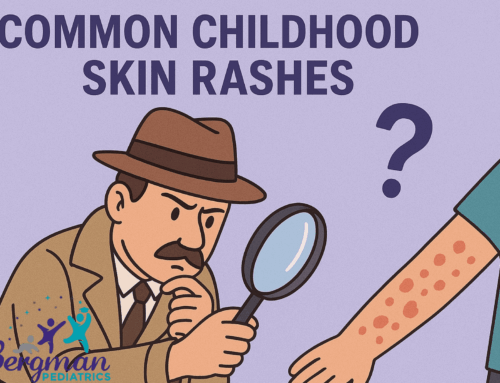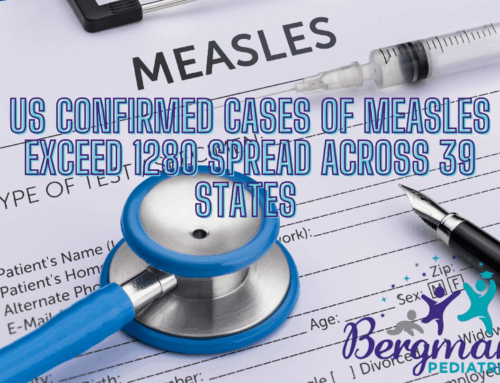May is Mental Health Awareness Month, a vital time to recognize the emotional well-being of children and teens. Mental health struggles can begin at any age, and early recognition and support are essential.
Why Children’s Mental Health Matters
According to the CDC, up to 1 in 5 children experience a mental health disorder each year. Yet, many go undiagnosed and untreated. Mental health influences how children think, feel, and act. It impacts how they handle stress, relate to others, and make choices. (CDC – Children’s Mental Health)
Ages 2–5: Toddlers & Preschoolers
Common Mental Health Concerns:
- Separation anxiety – Can be a normal part of development for children between ages 2 and 5, often manifesting as distress when separated from their primary caregiver. It’s typically seen in toddlers and preschoolers and can be triggered by changes in routine, new environments, or even feeling ill. While normal, persistent or intense separation anxiety can be a sign of Separation Anxiety Disorder (SAD) and may require professional help.
- Developmental delays affecting communication or social interaction (e.g., Autism Spectrum Disorder)
- Temper dysregulation – Tantrums are normal and common, especially as children develop their emotional regulation skills. This is different than Disruptive Mood Dysregulation Disorder (DMDD) is not typically diagnosed before age 6. DMDD is characterized by chronic, intense irritability and frequent anger outbursts that are disproportionate to the situation and occur several times per week for at least 12 months.
- Early signs of trauma-related disorders such as frequent crying, difficulty concentrating, regressive behaviors, and fear of separation from parents. Children may also exhibit nightmares, sleep problems, and difficulty regulating emotions, along with physical symptoms like stomach aches.
Warning Signs to Watch For:
- Frequent, intense tantrums beyond typical toddler behavior
- Delayed speech or social development
- Excessive fearfulness or clinginess
- Withdrawal from caregivers or peers
How Parents Can Help:
- Establish consistent routines: Predictability helps children feel safe.
- Use play as communication: Play therapy is often effective for this age.
- Name and validate emotions: Labeling feelings (“You’re sad because we left the park”) helps children learn emotional regulation.
- Seek early evaluation: If developmental or emotional concerns arise, consult your pediatrician or a child psychologist. Early intervention services may be available. (Zero to Three)
Ages 6–12: Elementary-Aged Children
Common Mental Health Concerns:
- Anxiety disorders (social anxiety, generalized anxiety)
- ADHD
- Behavioral disorders (Oppositional Defiant Disorder)
- Depression
Warning Signs to Watch For:
- Frequent headaches or stomachaches with no medical cause
- Difficulty focusing in school or following directions
- Low self-esteem or self-criticism
- Avoidance of school, friends, or previously enjoyed activities
How Parents Can Help:
- Foster open communication: Ask open-ended questions like, “What was something hard about today?”
- Build structure and responsibility: Chores, routines, and goals build confidence and predictability.
- Encourage physical activity: Exercise improves mood and reduces anxiety.
- Partner with schools: Work with teachers and counselors to monitor your child’s behavior and academic performance.
- Seek counseling: Cognitive-behavioral therapy (CBT) is often effective for anxiety and depression in this age group. (American Academy of Child & Adolescent Psychiatry)
Ages 13–18: Teenagers
Common Mental Health Concerns:
- Depression and anxiety
- Eating disorders
- Self-harm
- Substance use
- Risk of suicide
According to the National Alliance on Mental Illness (NAMI), 50% of all lifetime cases of mental illness begin by age 14, and 75% by age 24. (NAMI – Teens & Young Adults)
Warning Signs to Watch For:
- Persistent irritability or mood swings
- Decline in academic performance
- Isolation from friends or family
- Risk-taking behaviors or substance use
- Comments about hopelessness or self-harm
How Parents Can Help:
- Normalize mental health conversations: Let them know it’s okay to struggle and seek help.
- Watch social media use: Monitor their online interactions and screen time without being invasive.
- Respect independence while staying connected: Ask questions without judgment and be present.
- Know when to intervene: If there are signs of self-harm, suicidal thoughts, or substance abuse, contact a mental health professional immediately.
In crisis situations, call or text the Suicide & Crisis Lifeline at 988 or use the Crisis Text Line by texting HOME to 741741.
All Ages: How Parents Can Support Overall Mental Health
Regardless of your child’s age, these universal strategies can help promote mental wellness:
- Model healthy coping strategies: Children often mimic how adults handle stress.
- Be consistent yet flexible: Set boundaries with love and understanding.
- Promote self-expression: Encourage journaling, music, sports, or creative outlets.
- Stay informed: Visit reliable mental health websites and talk to professionals.
Helpful Resources
- Mental Health America – Recognizing Mental Health Problems in Children
- NAMI – Kids and Teens
- SAMHSA – For Parents and Caregivers
- CDC – Mental Health in Children
Final Thoughts
Children are resilient, but they also need our support. By understanding age-specific mental health concerns and creating open, loving, and structured environments, parents can foster emotional strength that lasts a lifetime. Mental health is just as important as physical health, and recognizing that early can make all the difference.





